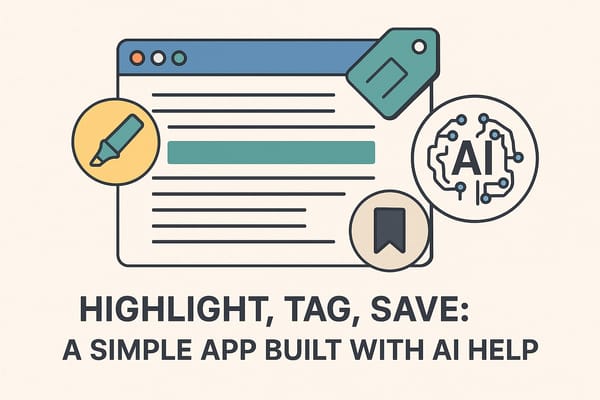Should I continue with my idea?
These days the word entrepreneur, founder, start-up, small business owner are very common and so it is the idea of starting a new business, especially in the tech and internet industries. Many of us dream of creating the next big thing, an awesome application used by millions of people, a service with public APIs that thousands of developers will use, etc… we are wannapreneurs! that is a term I stole from Patrick Foley’s Confessions of a Wannapreneur talk at the Business of Software conference last year, and from a blog post he wrote about it.
This post has the intention to show you some of the most common things that demotivate people about their ideas and dreams of becoming an entrepreneur and start a business. Hope it helps you as it has helped me while I was thinking and writing about it.
The idea generator
There are some of us who are always coming up with ideas, we cannot stop it, it is something that we have to deal with and it is part of who we are. Some of us might actually convince ourselves that one of our ideas is worth pursuing, and then off we go. One big problem is following up and actually end up executing an idea. While it is fun to think and talk to others about our ideas, the possibilities, coming up with domain names, starting to prototype a user interface, and start thinking about the architecture of the application, etc…, there is always something we need to do first, it is what I call the real work, you know, the stuff that we don’t want to do because we don’t know how or are not good at. This work is something that needs to happen to make an idea become a reality. For example, you can come up with a great idea for an app that will absolutely disrupt some existing technology or industry, before you change the world you need to make sure that what you are about to build is something that people will pay you for it… yes, and to do this you will need to get out and actually talk to normal human beings to tell them about your idea. Get feedback, make decisions, and then start. Register a domain name, work in a prototype, create a landing page, etc. The idea is to have something out there so you can continue with the feedback loop. Are you done? not even close, because if enough people get interested in your idea of a product, it means that after you build it you’ll have to sell it, do the accounting, do some marketing, handle payments, add features, etc… if you are a software developer like me, the thought about doing all these things is scary and is something that you are not looking forward to, I am certainly not looking forward to it. When time comes to do these tasks, remember that doing the tasks you don’t enjoy doing is super important and these tasks needs to get done, they are the means to an end, and without performing these tasks reaching your goal is not a reality.
The fear of competition
There are also some of us who will work and work not minding the boring work as long as it help us get a step closer to our goal. Then one day we realize that there are other people who are also working in the same or similar idea, or even worst (we think) an existing business offering the same type of application or service that we are working on. This usually causes many first-time entrepreneurs to doubt their ideas. In many cases, finding out that there are competitors might be enough for some people to stop working on their ideas or change it completely because their idea is not longer as unique or disruptive as they thought. I have felt like this before, it is hard not to, but feeling like this is foolish. When you want to start a company and there are already companies selling the same product or service that you want to sell, that just validates your idea and the market for it. Of course you’ll have a competitor or many, and that is OK, just make sure your company offers something that the competitors don’t, do a better job marketing your product and make sure what you offer adds value to your customers. Believe it or not, there is usually room for more players in almost any industry and market.
The day job
For many people, starting a company while having a day job is the only way to get started. Yeah many people will say that if you are really serious about being an entrepreneur that you should quit your day job and dedicate 100% of your time working in your startup, that is just crazy talk and usually comes from people who don’t have the need to have a full-time job while trying to become an entrepreneur. In the real world, when you have a family and a mortgage quitting your day job is not a wise idea and I strongly recommend against it. The good news is that you can still create a company, regardless of what naysayers tell you. For example, back in 1999 I was going to college, married, working full-time and we already had our first baby Jennifer, she was one year old. My wife was working for a big health insurance corporation and none of us were happy about the fact that our first child spent almost half a day under the care of someone else. We started a tax prep business, both my wife and I had some background in accounting and personal tax preparation having been preparing our own taxes every year for a while at the time. We asked our family and friends if they wanted us to prepare their income tax returns, a few of them agreed and so we started Sanchez Plus Services (it is now called TodoTax.com) and by 2001 we had a few dozen paying clients which was bringing enough money for my wife to stay home with our daughter. Today the tax prep business has become a life-style business, that is my wife’s home business and TodoTax has now over 500 paying customers all over the US, no office and no employees.
Having a day job while trying to launch a business gives you the option to take care of life expenses and support your business, people who do this usually work in their startup at night and weekends, and yes you can still have a balanced life that allows you to spend time with your family and friends, it is possible. The thinking that if you are not working on your idea 100% of the time is because you don’t believe in it, or at least not enough, is horse shit, each of us work with what we have and do as much as we can, do what works for you not what others tell you. Starting a company while having a day job is harder and it will take longer, yes, but it is not impossible and it is definitely the way to go when you don’t have the possibility to dedicate 100% of your time to your startup, if you need to keep your day job to pay the bills then keep it, and be very strict about spending as much time as you have left to your startup, without missing your life, make it happen. For example, I work on my startup at nights after my kids have gone to bed and dedicate some time during the weekends, usually very early in the morning and late at night. Do what works for you and remember that in then end, it is a personal choice, do what you think is best for you, follow your gut.
The naysayers
We all know them, they are in our family, our friends, co-workers, etc… these are the people who think you are nuts and can’t believe you are wasting your time trying to take a business off the ground. Usually these are the same people who are not ambitious, who don’t go the extra mile, and who work from 9-5 and are very happy about it. That is OK, do not try to convince them about your idea, just move on with it. The reason many people think of creating a business from scratch as a crazy and bad idea is because it terrifies them to just think about it, they cannot see themselves doing it and so they think is impossible for you to do it. Usually these people make very good employees, wannapreneurs do not, since we are not good at following directions, we question everything and are always trying to change things to find a better way, always.
Don’t get stuck with people’s feedback but do not ignore all of it either. If the feedback is just about your idea of creating a business you can ditch that. However, if people are actually giving you feedback about the idea, product or service that you are working on then ditch 90% of it and pay attention to about 10%, that is usually safe as most of the feedback is from naysayers who cannot see what you can. I am not implying to just go for it and create a product without doing some market research to find out if your product/service is something that people will actually pay you for it. Do your research, talk to everyone you can and make sure you get some people to say they will buy and not just like your product, Jason Cohen writes about this in a very direct non-bullshit way in this post, read it, it is good.
Continue with your idea, just working on it will help you learn more about yourself, it will push you to explore other ideas, and even meet people during your journey… the important thing here is that you keep the energy up surrounding yourself with people who will keep you motivated and always keep an open mind and be willing to change your vision, your idea and your goals. Good luck!
I am still working on my ideas (Webmica, StartupInterns), check them out and sign-up if you want to offer feedback and become part of the 10% that I pay attention to.
Most of my writing here is advice to myself and anyone who might need it, use it at your own risk. Cheers.




